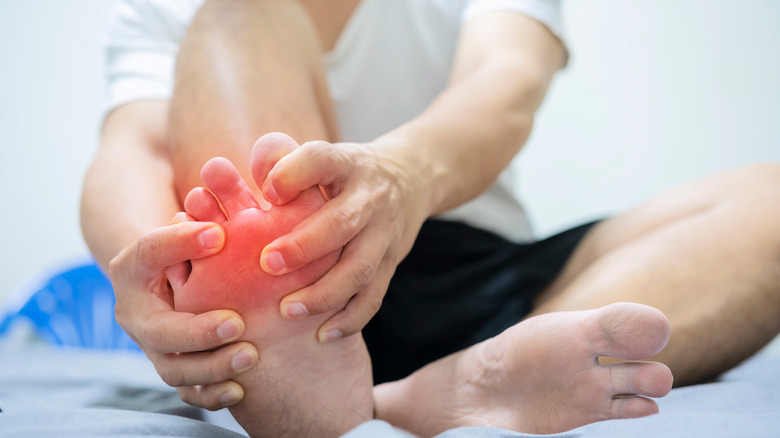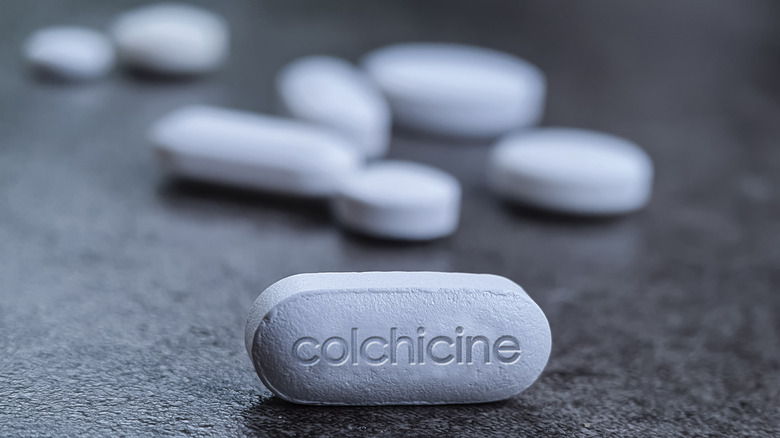This Is How Long It Takes For Gout Medications To Start Working
Gout is a common form of arthritis characterized by chronic pain, swelling, and inflammation of various joints, according to the Mayo Clinic. A 2014 study published in the journal Rheumatic Disease Clinics of North America notes that as of 2008, about 8.3 million adults in the United States have gout. The good news is that there are various treatment options for people with gout, according to MedicalNewsToday. As well as reducing the intake of certain foods and beverages that trigger gout, medications are also available, per Healthline.
Drugs.com lists nine types of gout medications, which come in various forms. A 2017 study published in Deutsches Ärzteblatt International notes that NSAIDs and gout medications like colchicine and allopurinol are top choices. MedlinePlus explains that these gout medications belong to a special class of drugs called xanthine oxidase inhibitors. This class of drugs functions by reducing the amount of uric acid in the body. If you've been prescribed a gout medication and are curious about its efficacy, you might wonder how long gout medications take to start working.
How long do gout medications take to work?
According to the Johns Hopkins Arthritis Center, gout flare-up symptoms peak within 12 to 24 hours of initial onset, and full recovery usually takes up to 14 days. Healthline adds that symptoms of gout should improve within about three days of treatment and warns that the symptoms may persist for about three weeks without treatment. Treatment times might differ based on which medication your doctor prescribes.
Allopurinol, for example, restricts the breakdown of purines and reduces uric acid levels, which are known to inflame joints and cause gout symptoms, according to a 2006 study published in Informed Health. WebMD says that people taking allopurinol might not see improvements in their condition for several weeks. In contrast, after starting the medication, they may have more gout attacks as the body tries to remove extra uric acid.
On the other hand, if you're using colchicine to treat flare-ups, you may not feel any different after taking the drug, even though it can start working within 30 minutes, according to the National Health Service (NHS). Usually, it takes one to two days before inflammation and pain start reducing.
How to take gout medications
According to the NHS, your doctor might take multiple blood tests to monitor uric acid levels before prescribing allopurinol. If prescribed, you might be advised to drink plenty of fluids to prevent dehydration, per the NHS. The source also adds that the dosage is usually one 500mg tablet, up to four times daily after food, depending on your doctor's prescription. Drugs.com says the dose normally starts at 100mg. Any amount above 300mg might have to be taken in divided doses after meals to reduce the risk of gastric irritation. The source also includes side effects like drowsiness, fever, and painful urination, which have been associated with allopurinol use. Therefore, people with underlying conditions like diabetes, hypertension, and congestive heart failure should consult their doctors before using allopurinol, per Drugs.com.
As for colchicine, this medication comes in liquid and tablet forms, and you can take it with or without food (via MedlinePlus). However, there's no one best way of taking it. The Mayo Clinic explains that the dosage your doctor prescribes might depend on your unique medical condition. For instance, adults can take 0.6mg of colchicine capsule or solution once or twice daily, per the Mayo Clinic.



